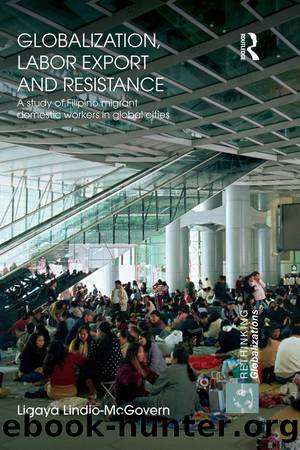Globalization, Labor Export and Resistance: A Study of Filipino Migrant Domestic Workers in Global Cities by Ligaya Lindio-McGovern

Author:Ligaya Lindio-McGovern [Lindio-McGovern, Ligaya]
Language: eng
Format: epub
Tags: Political Science, General
ISBN: 9781136644627
Google: LZaMAQAAQBAJ
Publisher: Routledge
Published: 2013-10-18T09:39:48+00:00
Filipino Nurses Support Group (FNSG)
With membership of over 300, FNSG is an organization of Filipino nurses (mostly female) who came in to Canada through the LCP, which, as previously mentioned, binds them to domestic service work for two consecutive years before they can qualify for âlandedâ or immigrant status. FNSG became the collective advocacy voice for PWCâs abolitionist scrap-LCP campaign, and raised the impact of LCP on Filipino nurses in Canada who are doing domestic service work. Its politics is policy-oriented, and its strategies for change mainly consist of consciousness-raising through organizing with regard to the situation of non-practicing Filipino nurses who are doing domestic work in Canada and lobbying for policy-changes that can advance their rights and welfare. One of the policy-changes that FNSG has advocated for is the accreditation of non-practicing Filipino nurses who are already in Canada and who mostly came in as domestic workers through the LCP. Advocating in favour of their accreditation is the first step toward achieving their demand to open Canadaâs nursing labor market for Filipino nurses who are already in Canada. FNSG argued that the Live-in-Caregivers Program segregates Filipino nurses in domestic service work and unregulated private home support that needs a source of cheap labor to make it a profitable business. They back their argument by pointing to the fact that Filipino nurses seeking entry to Canada are given zero occupational points while the Live-in-Caregivers Program seem to give preference to Filipino nurses who can provide quality elderly care as domestic workers.3
To give teeth to their demand to open the nursing labor market to Filipino nurses doing domestic service work in Canada, FNSG collectively lobbied to allow Filipino nurses who came to Canada through the LCP to apply to the British Columbia Provincial Nominee Program (PNP) â which was designed to recruit foreign-trained nurses into British Columbia and fast-track their acquisition of permanent residence in order to fill in the shortage of nurses in Canada â without jeopardizing their liability for âlandedâ status.4 Recall that the LCP requires them to complete two consecutive years of domestic service work before they can apply for permanent immigrant status and enter into another occupation other than domestic service work. They become illegal if they leave domestic service work before they complete the two-year period and lose their eligibility for landed status. Their collective lobbying for entry to PNP for more than two years was somewhat successful, to the extent that in January 2002, FNSG received word from Citizenship and Immigration Canada that Filipino and other foreign-trained nurses could now apply to PNP without jeopardizing their application for permanent residence. While FNSG viewed this government concession as a âvictory,â they saw other barriers to Filipino and other foreign-trained nurses practicing their profession in Canada that they must continue to address, such as the bureaucratic hurdles in the nursing accreditation process.5 This collective political action confronted what FNSG allegedly considered as the prejudiced and discriminatory stance of the Registered Nurses Association of British Columbia (RNABC) that
Download
This site does not store any files on its server. We only index and link to content provided by other sites. Please contact the content providers to delete copyright contents if any and email us, we'll remove relevant links or contents immediately.
Zero to IPO: Over $1 Trillion of Actionable Advice from the World's Most Successful Entrepreneurs by Frederic Kerrest(4569)
Machine Learning at Scale with H2O by Gregory Keys | David Whiting(4313)
Never by Ken Follett(3957)
Harry Potter and the Goblet Of Fire by J.K. Rowling(3857)
Ogilvy on Advertising by David Ogilvy(3622)
Shadow of Night by Deborah Harkness(3368)
The Man Who Died Twice by Richard Osman(3079)
Book of Life by Deborah Harkness(2939)
The Tipping Point by Malcolm Gladwell(2922)
Will by Will Smith(2920)
Purple Hibiscus by Chimamanda Ngozi Adichie(2854)
0041152001443424520 .pdf by Unknown(2846)
My Brilliant Friend by Elena Ferrante(2831)
How Proust Can Change Your Life by Alain De Botton(2814)
How to Pay Zero Taxes, 2018 by Jeff A. Schnepper(2655)
Hooked: A Dark, Contemporary Romance (Never After Series) by Emily McIntire(2554)
Rationality by Steven Pinker(2364)
Can't Hurt Me: Master Your Mind and Defy the Odds - Clean Edition by David Goggins(2341)
Borders by unknow(2315)
